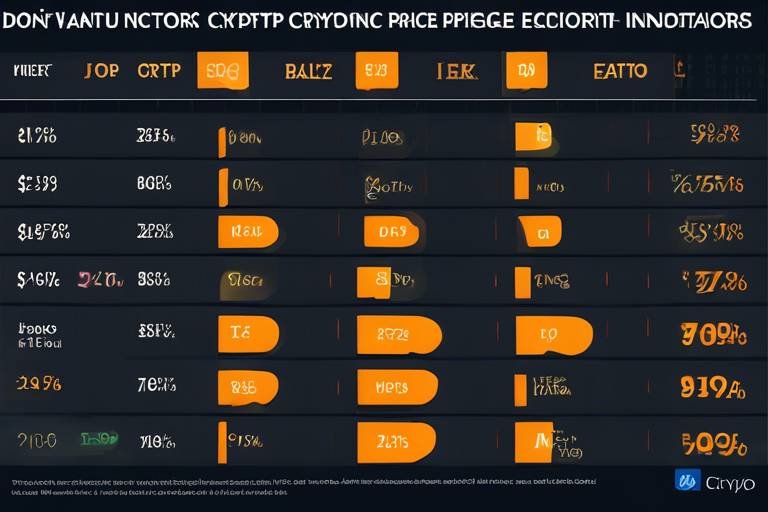The Rise of Decentralized Freelancing Platforms
The world of freelancing is undergoing a radical transformation, and at the heart of this evolution are decentralized freelancing platforms. These platforms are not just a trend; they represent a significant shift in how freelancers connect with clients, manage their work, and receive payments. Imagine a marketplace where you, as a freelancer, have complete control over your projects without the interference of a middleman. Sounds enticing, right? Well, that's precisely what decentralized platforms offer!
In traditional freelancing systems, intermediaries often dictate the terms of engagement, taking a hefty cut of your hard-earned money while imposing rules that may not align with your work style. But with decentralized platforms, the power dynamics shift dramatically. These platforms leverage blockchain technology to create a more transparent, secure, and efficient ecosystem for freelancers and clients alike. This article explores how these platforms are shaping the gig economy, offering unprecedented advantages while also facing unique challenges.
As we delve deeper into the implications of decentralization, it becomes clear that it's not just about technology; it's about empowerment. Freelancers can enjoy greater autonomy, allowing them to focus on what they do best—creating and delivering exceptional work. The rise of decentralized freelancing platforms is not merely a passing phase; it’s a revolution that promises to redefine the future of work.
Decentralization refers to the distribution of authority away from a central entity, and in the context of freelancing, it has profound implications. Imagine a world where every freelancer operates on a level playing field, free from the constraints imposed by traditional platforms. This section delves into the core principles of decentralization and how they translate into real benefits for freelancers.
At its core, decentralization enhances transparency and security. By utilizing blockchain technology, freelancers can track their work and payments in real-time, ensuring that every transaction is recorded and immutable. This level of transparency not only builds trust between freelancers and clients but also mitigates the risks of fraud that often plague traditional platforms. Furthermore, freelancers gain a sense of autonomy, allowing them to set their own rates, choose their clients, and dictate their working conditions.
Freelancers can enjoy numerous benefits from decentralized platforms, including lower fees, direct payments, and greater control over their work. These advantages are not just theoretical; they have the potential to significantly impact freelancers' livelihoods. Let's break down these benefits in detail.
One of the key attractions of decentralized platforms is the significantly reduced transaction fees. Traditional freelancing platforms often charge exorbitant fees that can eat into a freelancer's earnings. In contrast, decentralized platforms typically operate on a model that minimizes these costs. For instance, while traditional platforms might charge fees as high as 20%, decentralized platforms can reduce this to as low as 1-5%. This means more money in your pocket!
| Platform Type | Transaction Fees |
|---|---|
| Traditional Platforms | 15% - 20% |
| Decentralized Platforms | 1% - 5% |
Lower fees directly correlate to increased earnings for freelancers. Imagine if you could keep an additional 10% of your earnings—what could you do with that extra cash? Perhaps invest in better tools, take on more projects, or even enjoy a well-deserved vacation! This financial advantage is a significant motivator for freelancers to migrate to decentralized platforms.
Another compelling aspect of decentralized platforms is the ability to facilitate direct payments through blockchain technology. This enhances security and reduces the risk of fraud, creating a more trustworthy environment for both freelancers and clients. With smart contracts, payments are automatically processed when certain conditions are met, ensuring that freelancers are paid promptly for their work without the fear of chargebacks or disputes.
While there are many benefits, decentralized platforms also face challenges. Market adoption, regulatory hurdles, and user experience are significant issues that need addressing. Understanding these challenges is crucial for freelancers considering a switch to decentralized platforms.
Adoption rates for decentralized platforms can be slow due to existing habits and preferences. Many freelancers and clients are accustomed to traditional systems, making it challenging to convince them to transition to a new model. This section explores the barriers to widespread acceptance among freelancers and clients.
Navigating regulations can be complex for decentralized platforms. The legal landscape varies significantly across regions, affecting how these platforms operate and grow. This section discusses the implications of regulations on decentralized freelancing and how they can shape the future of this industry.
- What is a decentralized freelancing platform? - A platform that allows freelancers to connect directly with clients using blockchain technology, eliminating intermediaries.
- How do decentralized platforms ensure payment security? - They utilize smart contracts that automatically process payments when agreed-upon conditions are met.
- Are there any risks associated with decentralized platforms? - Yes, challenges include market adoption and navigating complex regulations.

Understanding Decentralization
Decentralization is a concept that has been gaining traction across various sectors, particularly in technology and finance. At its core, decentralization means distributing authority and control away from a central entity. This shift can be likened to a tree branching out; rather than relying on a single trunk for support, the tree spreads its branches far and wide, allowing for greater resilience and adaptability. In the context of freelancing, decentralization offers a myriad of implications that can significantly enhance the working experience for freelancers.
One of the most compelling aspects of decentralized freelancing platforms is their emphasis on transparency. Traditional freelancing platforms often operate behind closed doors, leaving freelancers in the dark about fees, payment processes, and client interactions. In contrast, decentralized platforms utilize blockchain technology, which creates a public ledger of transactions. This means that every payment and contract is recorded and can be verified by anyone involved. Imagine being able to see exactly where your money is going and how much is being deducted as fees—this level of transparency fosters trust and accountability.
Security is another critical advantage of decentralization. Traditional platforms are often vulnerable to hacking and fraud, putting freelancers at risk of losing their hard-earned income. Decentralized platforms, on the other hand, leverage the power of blockchain to enhance security. Each transaction is encrypted and linked to a unique identifier, making it nearly impossible for malicious actors to manipulate the system. This added layer of security not only protects freelancers but also encourages clients to engage with the platform, knowing their payments are secure.
Moreover, decentralization grants freelancers a newfound sense of autonomy. In traditional systems, freelancers often find themselves at the mercy of platform rules and regulations, which can be restrictive and limiting. Decentralized platforms empower freelancers by allowing them to set their own terms, negotiate directly with clients, and maintain control over their work. This shift can be likened to a bird soaring free in the sky, unencumbered by the constraints of a cage. With this autonomy, freelancers can choose projects that align with their values and skills, leading to greater job satisfaction and productivity.
However, the transition to a decentralized model is not without its challenges. For many freelancers, the concept of decentralization may seem foreign or intimidating. They might be accustomed to the familiar structure of traditional platforms and hesitant to embrace a new way of working. Yet, the benefits of decentralization—transparency, security, and autonomy—are powerful motivators that can encourage freelancers to explore these innovative platforms.
In summary, understanding decentralization is crucial for freelancers looking to navigate the evolving gig economy. By embracing this model, they can enjoy a more transparent, secure, and autonomous working environment. As the landscape of freelancing continues to change, those who adapt to these new technologies will likely find themselves at the forefront of a revolution that reshapes how work is done.

Benefits for Freelancers
The emergence of decentralized freelancing platforms has brought a wave of change to the gig economy, offering freelancers a plethora of benefits that traditional systems simply cannot match. Imagine a world where you have greater control over your work, where your earnings are not siphoned off by hefty fees, and where you can connect directly with clients without intermediaries. This is the promise of decentralized platforms, and it’s not just a dream; it’s becoming a reality. Freelancers are discovering that these platforms not only enhance their financial prospects but also empower them to take charge of their careers like never before.
One of the most significant advantages freelancers enjoy on decentralized platforms is the lower transaction fees. Traditional freelancing sites often impose steep fees that can eat into your hard-earned income. In contrast, decentralized platforms leverage blockchain technology to minimize these costs. For instance, while a traditional platform might take 20% of your earnings, decentralized options can reduce this fee to as little as 1-5%. This means more money stays in your pocket, allowing you to invest in tools, training, or even a well-deserved vacation.
| Platform Type | Typical Transaction Fees |
|---|---|
| Traditional Freelancing Platforms | 15% - 20% |
| Decentralized Freelancing Platforms | 1% - 5% |
But the benefits don’t stop there! Direct payments are another game-changer. With decentralized platforms, freelancers can receive payments instantly through blockchain technology. This not only enhances security but also ensures that funds are less susceptible to fraud. Imagine completing a project and getting paid immediately, without waiting days or weeks for the transaction to process. This immediacy fosters a sense of trust between freelancers and clients, making it easier to build long-lasting professional relationships.
Moreover, freelancers gain a newfound autonomy over their work. In traditional setups, platforms often dictate the rules, from pricing to project terms. However, decentralized platforms allow freelancers to set their own terms and negotiate directly with clients. This level of control can be liberating, as it enables freelancers to showcase their unique skills and tailor their services to meet specific client needs. In essence, you’re not just another cog in the wheel; you’re the driver of your own career.
Additionally, the transparency that comes with decentralized systems cannot be overlooked. Every transaction is recorded on the blockchain, providing a clear and immutable record of work completed and payments made. This transparency not only builds trust but also gives freelancers a sense of security knowing that their work and payments are protected from disputes.
In conclusion, the benefits of decentralized freelancing platforms are numerous and compelling. From lower fees to direct payments, enhanced security, and greater autonomy, these platforms are reshaping the way freelancers operate. As more professionals become aware of these advantages, it’s likely we will see a significant shift in the gig economy landscape, with freelancers embracing the freedom and flexibility that decentralized platforms offer.

Lower Transaction Fees
One of the most enticing features of decentralized freelancing platforms is the promise of . Traditional freelancing platforms often impose hefty fees, which can eat into a freelancer's hard-earned income. These fees can range anywhere from 10% to 20% of a project’s total cost, depending on the platform. Now, imagine if you could keep more of your earnings! This is where decentralized platforms shine, often charging fees as low as 1% to 5%. This dramatic reduction in fees can significantly boost a freelancer’s bottom line.
Let’s break it down a bit. When a freelancer completes a project worth $1,000 on a traditional platform with a 15% fee, they take home only $850. However, on a decentralized platform with a mere 3% fee, the same freelancer walks away with $970. That’s a difference of $120! This stark contrast can be a game changer, especially for freelancers who juggle multiple projects. The more they earn, the more they can reinvest in their skills or even save for a rainy day.
Moreover, these lower fees are not just a one-time benefit; they can create a ripple effect. With more money in their pockets, freelancers can afford to lower their rates to attract more clients, creating a competitive edge in the market. This could lead to a win-win situation where clients benefit from lower costs while freelancers enjoy a larger volume of work. It’s like a virtuous cycle that boosts the entire ecosystem.
To illustrate this further, let’s take a look at a simple comparison table:
| Platform Type | Project Value ($) | Transaction Fee (%) | Earnings After Fee ($) |
|---|---|---|---|
| Traditional Platform | 1,000 | 15 | 850 |
| Decentralized Platform | 1,000 | 3 | 970 |
This table clearly shows how much more freelancers can earn by choosing decentralized platforms over traditional ones. It’s not just about the numbers; it’s about the freedom and control that come with it. Freelancers can focus on what they do best—delivering quality work—without the constant worry of losing a significant chunk of their income to fees.
In conclusion, the allure of lower transaction fees on decentralized freelancing platforms is hard to ignore. As more freelancers become aware of these benefits, we can expect a shift in the industry that favors transparency and fairness. With the potential to significantly increase their earnings, it’s no wonder that many are making the switch. Are you ready to join the revolution?

Comparison with Traditional Platforms
When we look at the landscape of freelancing, traditional platforms like Upwork and Fiverr have dominated for years. They have established a solid user base and a recognizable brand. However, as the gig economy evolves, decentralized platforms are emerging as formidable competitors. The fundamental difference lies in how these platforms operate. Traditional platforms are centralized, meaning they control the entire ecosystem, from payment processing to dispute resolution. This centralization often results in higher fees that can eat into a freelancer's earnings.
For instance, traditional platforms typically charge between 15% to 20% in fees. This can be quite a hefty sum, especially for freelancers who rely on every dollar they earn. In contrast, decentralized platforms can reduce these fees significantly, often to less than 5%. This is primarily due to the absence of intermediaries in decentralized systems, where blockchain technology allows freelancers to connect directly with clients. The table below illustrates the stark difference in transaction fees:
| Platform Type | Typical Transaction Fee |
|---|---|
| Traditional Platforms | 15% - 20% |
| Decentralized Platforms | 1% - 5% |
This significant reduction in fees not only increases a freelancer's take-home pay but also encourages more professionals to join decentralized platforms. With lower fees, freelancers can offer more competitive rates, attracting a broader client base. This change could potentially shift the balance of power in the freelancing world, allowing freelancers to dictate terms rather than having to conform to the demands of a centralized authority.
Moreover, traditional platforms often impose stringent rules regarding how freelancers can market their services and interact with clients. This can stifle creativity and limit opportunities for freelancers to showcase their unique skills. On the other hand, decentralized platforms promote autonomy and flexibility. Freelancers can create their own profiles, set their own rates, and choose the projects they want to work on without the fear of being penalized for their choices.
However, while decentralized platforms offer enticing benefits, they also come with their own set of challenges. For instance, the lack of a central authority means that dispute resolution can be more complicated. Freelancers may find themselves navigating a less structured environment, which can be daunting for those accustomed to the support that traditional platforms provide. This is where the balance between autonomy and security becomes crucial.
In conclusion, the comparison between traditional freelancing platforms and their decentralized counterparts highlights a significant shift in how freelancers can operate in the gig economy. As more professionals become aware of the benefits that decentralized platforms offer, we may witness a gradual migration away from traditional systems. This evolution promises not only to empower freelancers but also to reshape the entire freelancing landscape.
- What are decentralized freelancing platforms? Decentralized freelancing platforms are online marketplaces that utilize blockchain technology to connect freelancers directly with clients, eliminating intermediaries and reducing fees.
- How do transaction fees compare between traditional and decentralized platforms? Traditional platforms typically charge 15% to 20% in fees, while decentralized platforms can charge as little as 1% to 5%.
- What are the benefits of using decentralized platforms? Benefits include lower fees, direct payments, increased autonomy, and enhanced security through blockchain technology.
- Are there any challenges associated with decentralized platforms? Yes, challenges include market adoption issues, regulatory hurdles, and complexities in dispute resolution.

Impact on Earnings
The shift towards decentralized freelancing platforms is not just a trend; it's a revolution that holds the potential to significantly boost earnings for freelancers. Imagine a world where every dollar you earn is yours to keep, without the hefty cuts taken by traditional platforms. This is precisely what decentralized systems offer. By eliminating intermediaries and reducing transaction fees, freelancers can retain a larger portion of their hard-earned income. But how does this translate into real-world earnings? Let's break it down.
Consider a scenario where a freelancer charges $1,000 for a project. On a traditional platform, fees can range from 10% to 20%, meaning the freelancer might only see $800 to $900 after fees. Now, with a decentralized platform, fees can be as low as 1% to 5%. This means the same freelancer could take home between $950 and $990. Over time, these savings accumulate, significantly impacting overall earnings. For example, if a freelancer completes just ten projects a year, the difference in earnings could be:
| Platform Type | Fee Percentage | Earnings After Fees |
|---|---|---|
| Traditional Platform | 20% | $800 |
| Decentralized Platform | 5% | $950 |
Over the course of a year, this could mean an extra $1,500 to $1,900 in the freelancer's pocket, depending on the number of projects completed. This financial advantage can serve as a powerful motivator for freelancers to make the switch. Moreover, the direct payment structure of decentralized platforms allows freelancers to receive their payments instantly, cutting out the waiting periods often associated with traditional platforms. This immediate access to funds can be crucial for freelancers, especially those who rely on their earnings to cover living expenses.
Additionally, the transparency inherent in decentralized platforms fosters a sense of trust between freelancers and clients. When freelancers know that they will be paid fairly and promptly, they are more likely to invest their time and effort into delivering high-quality work. This can lead to better client relationships, repeat business, and even referrals, all of which can further enhance earnings.
In summary, the impact on earnings for freelancers using decentralized platforms is profound. By reducing fees, enabling direct payments, and promoting trust, these platforms are not just changing the way freelancers work; they are reshaping their financial futures. So, if you're a freelancer looking to maximize your income, now might be the perfect time to explore the opportunities offered by decentralized freelancing.
- What are decentralized freelancing platforms? Decentralized freelancing platforms are online marketplaces that connect freelancers with clients without a central authority, often utilizing blockchain technology to facilitate transactions.
- How do decentralized platforms reduce fees? By eliminating intermediaries and utilizing smart contracts, decentralized platforms can lower transaction fees significantly compared to traditional platforms.
- Are decentralized platforms secure? Yes, decentralized platforms often use blockchain technology, which enhances security and reduces the risk of fraud.
- What challenges do decentralized platforms face? Some challenges include slow market adoption, regulatory hurdles, and the need for a user-friendly experience.

Direct Payments and Security
In the evolving world of freelancing, direct payments facilitated by blockchain technology are revolutionizing the way freelancers and clients interact. Imagine a world where you no longer have to wait days or even weeks for your hard-earned money to reach your bank account. With decentralized platforms, payments are made directly and instantly, ensuring that freelancers receive their funds as soon as the work is completed. This not only enhances cash flow but also boosts the overall experience for freelancers, allowing them to focus on what they do best—creating amazing work.
One of the most significant advantages of direct payments is the enhanced security they offer. Traditional platforms often involve multiple intermediaries, each adding a layer of complexity and potential risk. These intermediaries can be vulnerable to hacking, fraud, or mismanagement, putting freelancers' earnings at risk. In contrast, decentralized platforms utilize blockchain technology, which provides a transparent and immutable ledger of transactions. This means that once a payment is made, it cannot be altered or tampered with, creating a sense of trust between freelancers and clients.
Moreover, the use of smart contracts—self-executing contracts with the terms of the agreement directly written into code—further enhances security. These contracts automatically execute payments when predefined conditions are met, eliminating the need for trust in a third party. For example, if a freelancer completes a project and submits it for review, the smart contract can automatically release the payment once the client approves the work. This level of automation not only speeds up transactions but also reduces the likelihood of disputes over payments.
However, while the benefits of direct payments and security are clear, it's essential to understand how these elements work together to create a safer freelancing environment. Here’s a breakdown of how direct payments enhance security:
- Instant Transactions: No more waiting for payment; funds are transferred immediately.
- Reduced Fraud Risk: With fewer intermediaries, there are fewer opportunities for fraud.
- Transparency: Every transaction is recorded on the blockchain, providing a clear audit trail.
- Smart Contracts: Automate payment processes, ensuring that freelancers get paid for completed work.
In conclusion, the shift towards direct payments on decentralized platforms is not just a trend; it’s a fundamental change in how freelancers can secure their income. By leveraging blockchain technology, freelancers can enjoy a more secure, efficient, and transparent payment process. As more professionals recognize the benefits of these platforms, we can expect to see a significant transformation in the freelancing landscape, ultimately leading to a more empowered gig economy.

Challenges of Decentralized Platforms
The rise of decentralized freelancing platforms has certainly stirred excitement in the gig economy, but it's not all sunshine and rainbows. Like any emerging technology, these platforms come with their own set of challenges that can hinder their growth and adoption. One of the primary hurdles is market adoption. Many freelancers and clients are accustomed to traditional platforms, which have established trust and familiarity over the years. Breaking these habits can be tough. Just like trying to convince someone to switch from their favorite coffee shop to a new, untested one, it often takes time, incentives, and a lot of marketing to change minds.
In addition to market adoption, decentralized platforms also face regulatory challenges. The legal landscape surrounding cryptocurrencies and blockchain technology is still evolving. Different regions have different laws, and navigating this complex web can be daunting for platform developers. For instance, some countries might impose strict regulations on cryptocurrency transactions, while others might embrace them wholeheartedly. This inconsistency can create uncertainty for both freelancers and clients, making them hesitant to fully engage with decentralized platforms.
Moreover, user experience is another critical issue. While decentralized platforms promise greater autonomy and lower fees, they often require users to have a certain level of technical knowledge. For instance, a freelancer unfamiliar with blockchain technology might find it challenging to set up a digital wallet or navigate a decentralized marketplace. This complexity can deter potential users, especially those who are not tech-savvy. To illustrate, consider a traditional freelancing platform where signing up is as easy as filling out a form; decentralized platforms often require additional steps that can be overwhelming for some.
In summary, while decentralized freelancing platforms offer exciting prospects, they are not without their challenges. Overcoming market adoption issues, navigating regulatory hurdles, and ensuring a smooth user experience will be vital for these platforms to thrive. As the gig economy continues to evolve, it will be fascinating to see how these challenges are addressed and what the future holds for decentralized freelancing.
- What are decentralized freelancing platforms?
Decentralized freelancing platforms are online marketplaces that use blockchain technology to connect freelancers with clients directly, eliminating the need for intermediaries. - How do decentralized platforms reduce fees?
These platforms often have lower operational costs than traditional platforms, allowing them to charge lower transaction fees on payments. - Are decentralized platforms secure?
Yes, they utilize blockchain technology, which enhances security by providing transparent and immutable transaction records. - What challenges do decentralized platforms face?
Challenges include market adoption, regulatory hurdles, and user experience issues that can hinder their growth.

Market Adoption Issues
The journey of decentralized freelancing platforms is not without its bumps in the road. One of the most significant hurdles these platforms face is market adoption. While the concept of decentralization is exciting and offers numerous benefits, many freelancers and clients are still accustomed to traditional systems. This resistance to change can stem from a variety of factors, including a lack of understanding of how decentralized platforms work, fear of the unknown, and simply the comfort of established practices.
Many freelancers have built their careers on traditional platforms, and switching to a new system can feel like jumping into the deep end without knowing how to swim. Additionally, clients often prefer platforms they know and trust, which can create a significant barrier for decentralized options trying to gain traction. Imagine trying to convince someone to switch their favorite coffee shop because a new one opened up across the street; it’s a tough sell, right? The same applies here.
Moreover, the learning curve associated with decentralized platforms can deter potential users. Freelancers and clients may find themselves overwhelmed by the technology behind blockchain and smart contracts. To further illustrate this point, here's a brief overview of potential barriers:
- Technological Literacy: Not all freelancers are tech-savvy, and the complexity of decentralized platforms can intimidate those less familiar with digital tools.
- Trust Issues: With the rise of scams in the online world, many users are wary of new platforms that operate outside their established norms.
- Network Effects: The value of a platform often increases with the number of users. A lack of users on decentralized platforms can lead to a vicious cycle of low adoption.
Another critical aspect is the community aspect of freelancing. Many freelancers thrive on the interactions and networking opportunities that traditional platforms provide. They often find camaraderie in the shared experience of working within a familiar system. Decentralized platforms, while offering potential for greater autonomy, might lack the same level of community engagement, making it harder for freelancers to feel connected.
To overcome these adoption challenges, decentralized platforms need to focus on user education and community-building initiatives. By providing resources that demystify the technology and promote the benefits of decentralization, they can gradually win over skeptics. Additionally, creating forums or social spaces for users to connect can help foster a sense of belonging and trust within the new ecosystem.
In conclusion, while the potential of decentralized freelancing platforms is enormous, addressing market adoption issues is crucial for their success. By understanding the barriers and actively working to dismantle them, these platforms can pave the way for a more inclusive and accessible gig economy.
- What are decentralized freelancing platforms?
Decentralized freelancing platforms operate without a central authority, using blockchain technology to facilitate transactions directly between freelancers and clients. - How do decentralized platforms reduce fees?
These platforms eliminate intermediaries, which significantly lowers transaction costs, allowing freelancers to keep more of their earnings. - Are decentralized platforms secure?
Yes, they often use blockchain technology, which enhances security and reduces the risk of fraud. - What challenges do decentralized platforms face?
Challenges include market adoption issues, regulatory hurdles, and the need for user-friendly interfaces.

Regulatory Challenges
The journey of decentralized freelancing platforms is not without its bumps in the road, particularly when it comes to . As these platforms rise in popularity, they often find themselves navigating a complex web of laws and regulations that can vary significantly from one region to another. This regulatory landscape can be likened to a maze; while some paths may lead to opportunities, others may lead to dead ends or even legal pitfalls.
One of the primary challenges is the lack of a unified regulatory framework. In many countries, the laws governing digital currencies and decentralized applications are still in their infancy. This creates uncertainty for both freelancers and clients who want to engage in transactions using these platforms. For instance, a freelancer in one country may face different legal implications than a client in another, complicating the trust and reliability that are essential in any freelancing relationship.
Additionally, regulatory bodies often struggle to keep pace with the rapid evolution of technology. As new decentralized platforms emerge, regulators may find themselves playing catch-up, trying to understand the implications of blockchain technology and smart contracts. This lag can lead to a reactive rather than proactive approach to regulation, which can stifle innovation and deter both freelancers and clients from fully embracing these platforms.
Moreover, concerns about money laundering and fraud can lead to increased scrutiny of decentralized platforms. Regulators are often wary of how these platforms can be exploited for illegal activities, which can result in stringent compliance requirements. For instance, platforms may be required to implement Know Your Customer (KYC) protocols, which can deter freelancers who value their privacy and autonomy.
Here’s a quick overview of some of the key regulatory challenges faced by decentralized freelancing platforms:
- Unclear Legal Status: Many countries have not clearly defined the legal status of cryptocurrencies and decentralized applications.
- Compliance Costs: Meeting regulatory requirements often incurs additional costs, which can be burdensome for startups.
- Risk of Overregulation: Excessive regulation can hinder innovation and limit the potential of decentralized platforms.
In summary, while decentralized freelancing platforms offer exciting opportunities for both freelancers and clients, they must navigate a challenging regulatory landscape. As these platforms continue to evolve, it will be crucial for stakeholders to advocate for clearer regulations that support innovation while ensuring security and trust in the gig economy.
- What are decentralized freelancing platforms? Decentralized freelancing platforms use blockchain technology to connect freelancers with clients directly, eliminating the need for intermediaries.
- How do regulatory challenges affect freelancers? Regulatory challenges can create uncertainty, increase compliance costs, and potentially limit the growth of decentralized platforms.
- Are decentralized platforms safer than traditional ones? Decentralized platforms can enhance security through direct payments and smart contracts, but they also come with their own risks, including regulatory scrutiny.
Frequently Asked Questions
- What are decentralized freelancing platforms?
Decentralized freelancing platforms are online marketplaces that operate without a central authority, allowing freelancers and clients to connect directly. They leverage blockchain technology to facilitate transactions, ensuring transparency and security while reducing reliance on traditional intermediaries.
- How do decentralized platforms benefit freelancers?
Freelancers benefit from lower transaction fees, direct payments, and increased control over their work. Unlike traditional platforms that often take a significant cut of earnings, decentralized platforms typically charge much lower fees, allowing freelancers to keep more of their hard-earned money.
- Are transaction fees really lower on decentralized platforms?
Yes! One of the primary advantages of decentralized platforms is their ability to significantly reduce transaction fees. Many traditional freelancing sites charge fees ranging from 10% to 20%, while decentralized platforms can offer fees as low as 1% to 5%, directly impacting freelancers' overall earnings.
- How secure are direct payments on decentralized platforms?
Direct payments on decentralized platforms are generally more secure due to the use of blockchain technology. This technology ensures that transactions are recorded transparently and immutably, making it difficult for fraud to occur. Both freelancers and clients can trust that their payments are safe and that they will be executed as agreed.
- What challenges do decentralized freelancing platforms face?
Decentralized freelancing platforms face several challenges, including slow market adoption, regulatory hurdles, and user experience issues. Many freelancers and clients are accustomed to traditional systems, making it difficult for new platforms to gain traction. Additionally, navigating the complex legal landscape can hinder growth.
- Why is market adoption an issue for decentralized platforms?
Market adoption is challenging because many freelancers and clients are used to the established norms of traditional freelancing platforms. Changing habits and preferences takes time, and without significant incentives or education about the benefits of decentralized platforms, many may hesitate to make the switch.
- How do regulations affect decentralized freelancing?
Regulations can significantly impact the growth of decentralized freelancing platforms. Each region has its own legal requirements and restrictions, which can complicate operations. Platforms must navigate these regulations carefully to ensure compliance while trying to innovate and expand their services.



















